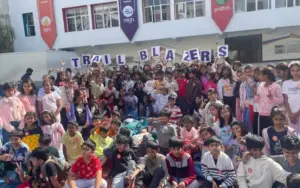The Importance of Physical Education: A Comprehensive Overview
All work and no play makes Jack a dull boy. This proverb is enough to emphasize the importance of physical education in one’s life. Physical education teaches skills and imparts knowledge about physical activities that will help individuals maintain a healthy lifestyle. Physical activities can take any form, such as sports, dance, exercise, etc. In the Indian educational system, students are taught about physical education with the help of a dedicated period called PE (physical education) or PT (physical training). A specialised PT teacher is also allotted to instruct students.
The Role of Physical Education in Student Development
Physical health benefits
Physical activities improve the quality of sleep. It improves muscular strength, resilience, and overall body fitness. It also reduces the chances of falling ill. Through walking, sprinting, exercising, aerobics, strength training, or playing a sport, the body enhances its immune system and improves skill development. When these activities are picked up at a very young age, they help maintain a constant weight, improve fragility, and delay illness. Adopting a nutrient-rich diet and exercising daily can aid in averting lifestyle diseases like obesity, diabetes, etc. It contributes to lifelong well-being.
Mental and emotional well-being
Cognitive skills are already instilled in a student through the curriculum. However, to facilitate and enhance these skills, the body must be sound and fit to reduce stress levels. Students are burdened with the vast syllabus and exams. Physical education is essential to relieve tension and improve overall well-being. Physical activities divert students from their anxiety and improve their mood, creating a positive attitude. It further enhances the quality of sleep and provides emotional stability.
Social skills and teamwork
Activities like sports encourage teamwork and collaboration. Students interact with others, learn to adjust, and share responsibilities. They also teach students to respect other people’s opinions and perspectives. Physical education transmits skills like competitive spirit, communication, leadership, endurance, trust, and peaceful conflict resolution.
The Impact of Physical Education on Academic Performance
Physical education helps students improve their focus, retention of topics, and attention span. It also subconsciously increases their concentration power, nudges them to be disciplined and enhances their critical thinking and problem-solving skills. As a result, students develop a positive and determined attitude, which will also help them perform better in academics. Additionally, it motivates students to become more engaged in their studies. A calm mind allows them to grasp the subject matter quickly. Moreover, healthy students are less likely to skip classes, leading to improved academic performance.
Physical Education in the Indian Context
In a troubling discovery revelation, it has been noted that many children in India are facing issues such as obesity, malnourishment, being underweight, or stunted growth. A significant factor contributing to this is the increased consumption of junk food, and excessive screen time. Many children now prefer indoor activities like watching movies or playing video games. This trend has had a severe impact not only on their physical health but also on their mental well-being, leading to increased cases of depression and suicide. In such a challenging scenario, physical education becomes more evident.
There are a few challenges in physical education in India:
- Excessive preference for academics over sports.
- Lack of proper infrastructure, like trained teachers, equipment, etc.
- Overdependence of students on TV, mobiles, etc.
- Inadequate awareness
- Fund constraints
Current Trends and Initiatives
Of late, physical education has gained momentum. Its importance has been recognized and realized by schools and the government. Therefore, the government has introduced various initiatives to motivate students to partake in these physical activities. A few successful initiatives have been described below:
- Khelo India Program: This program was started to encourage young children to participate in sports. It provides financial aid to the best athletes and offers training and infrastructure facilities.
- Fit India Movement: It began by urging students to participate in physical activities daily. It promoted healthy eating and sports participation to become physically fit.
The schools also acknowledge physical education’s positive impact on students’ mental health, physical well-being, and academic performance. They are trying to upgrade the infrastructure, provide amenities, appoint trained instructors, and encourage students to pick up physical activity.
Conclusion
Physical education has been picking up pace with all the positive influence it has had on students. Its vital role in students’ cognitive and physical development, along with enhanced academic excellence, is worth the appreciation it has received. Students should be encouraged to cultivate healthy eating habits, pick up a sport, follow a diet, and exercise regularly. This does lead to better overall physical and mental health, which are keys to living a satisfied and stress-free life.
Frequently Asked Questions (FAQs)
- Why is physical education necessary for students?
Physical education boosts concentration and retention abilities, which results in better academic performance. It is also crucial to maintain a healthy body and mind. This process also cultivates essential life skills like communication, trust, and teamwork. - How does physical education impact academic performance?
It has been observed that physical education facilitates focus, increases energy levels, and improves concentration. Time management and discipline learnt through sports and exercises also help achieve academic success. Reduced stress levels have a calming effect on the mind, promoting an increased attention span. - What are the challenges faced in implementing physical education in India?
Inadequate infrastructure, less emphasis on physical education, a scarcity of trained teachers, children’s addiction to screens, and a lack of awareness are some common challenges schools face in implementing physical education in India.






